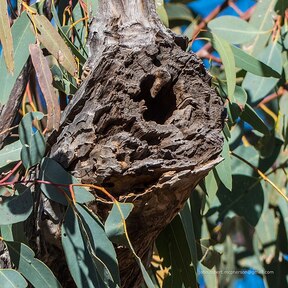
Today I read a Pocket Worthy article on incubation calling and climate change. Many birds sing to their babies while they’re still in the egg. This has a number of known and unknown evolutionary advantages. Incubation calling helps many birds imprint who their mother is. For some birds, like fairy wrens, it helps mothers avoid raising parasitic cuckoos. Research also has found that the music that zebra finches sing to their eggs changes growth and behavior. In particular, these songs help baby birds be prepared to adapt to changing environmental conditions caused by climate change. This is a new area for research, and there’s a lot scientists don’t know about these songs.
Zebra finch mothers, who live in the harsh Australian Outback, do most of the incubation. Like many bird species, the males are more brightly colored than females, and sing more complex songs. However, zebra finch mothers sing a particular incubation call when temperature climbs above 78 F. Growth and development differs between eggs who experience that particular incubation call. This incubation call helps the baby birds grow smaller than average, which then leads to the advantage of more efficient thermoregulation in hotter environments. These effects are felt into adulthood, as this next generation of birds chose hotter areas to make their nests.
Are these incubation calls one, of many, of the songs of global climate change? What might this music mean for music education? Do our songs affect development as obviously as the Zebra finch mothers' songs do? Probably not. But it's interesting to consider anyway.
DS
Link to image: https://upload.wikimedia.org/wikipedia/commons/thumb/1/1e/Zebra_finch_nest_hollow_Burke_River_floodplain_Boulia_Queensland_P1030205.jpg/640px-Zebra_finch_nest_hollow_Burke_River_floodplain_Boulia_Queensland_P1030205.jpg
 RSS Feed
RSS Feed
